提示信息(tooltip),是指当鼠标悬停在图表上的某点时,以提示框的形式展示该点的数据,比如该点的值,数据单位等。tooltip 内显示的信息完全可以通过格式化函数动态指定;通过调用 chart.tooltip(false) 即可不启用提示信息功能。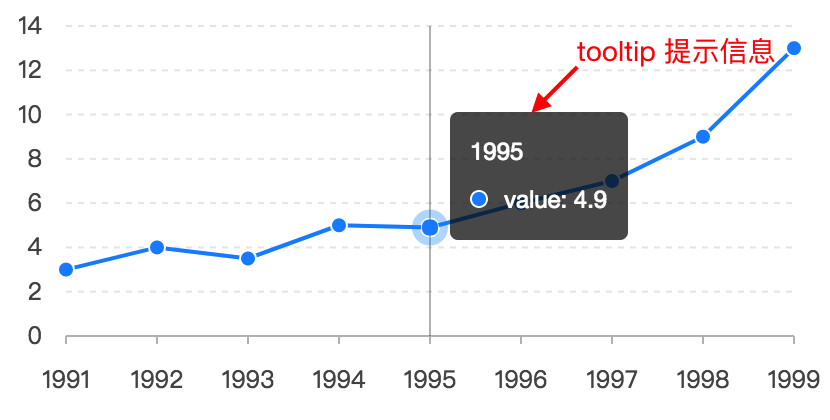
tooltip 配置语法
在 G2 中提供了个层次的配置 tooltip 的方法,
设置在 chart 对象上的tooltip 样式、功能相关的配置,
设置在每个几何标记对象上的 tooltip 配置,具体如下:
(1) chart 上的 tooltip 方法
chart.tooltip(true, cfg); // 开启 tooltip,并设置 tooltip 配置信息chart.tooltip(cfg); // 省略 true, 直接设置 tooltip 配置信息chart.tooltip(false); // 关闭 tooltip
常用的 tooltip 配置信息如下,注意,G2 的 tooltip 是使用 html 进行渲染的。
chart.tooltip({triggerOn: 'mousemove' | 'click' | 'none', // tooltip 的触发方式,默认为 mousemoveshowTitle: {boolean}, // 是否展示 title,默认为 truecrosshairs: {type: 'rect' || 'x' || 'y' || 'cross',style: {// 图形样式}}, // tooltip 辅助线配置offset: 10, // tooltip 距离鼠标的偏移量containerTpl: '<div class="g2-tooltip">'+ '<div class="g2-tooltip-title" style="margin:10px 0;"></div>'+ '<ul class="g2-tooltip-list"></ul></div>', // tooltip 容器模板itemTpl: '<li data-index={index}><span style="background-color:{color};width:8px;height:8px;border-radius:50%;display:inline-block;margin-right:8px;"></span>{name}: {value}</li>', // tooltip 每项记录的默认模板inPlot: true, // 将 tooltip 展示在指定区域内follow: true, // tooltip 是否跟随鼠标移动shared: true || false, // 默认为 true, false 表示只展示单条 tooltipposition: 'left' || 'right' || 'top' || 'bottom' // 固定位置展示 tooltip});
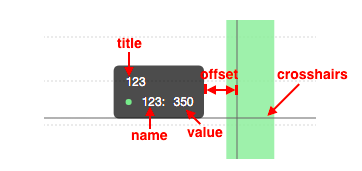
更详细的配置请查看 tooltip api。
(2)geom 对象上的 tooltip 配置
- 可以在 geom 几何标记上配置 tooltip 的显示内容,如下语法所示:
chart.<geom>.tooltip('field1*field2...*fieldN');
这个时候 tooltip 的显示内容如下:
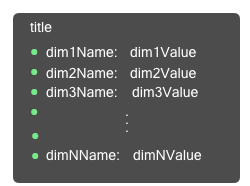
- 使用回调函数自定义 tooltip 信息, 默认情况下tooltip 的每一项包含以下信息:
title 标题,默认tooltip 的标题取第一项的 title
name 标题
value 值
color 图例项对应的颜色
index 索引值
所以在回调函数中可以通过修改这几个值,达到自定义tooltip 的目的
chart.<geom>.tooltip('a*b', (a, b) => {return {name: a,value: b};});
- 除了调用
chart.tooltip(false)关闭 tooltip 外,还可以在 geom 上关闭 tooltip。配置方法如下:
chart.point().tooltip(false);
配置示例
tooltip 的目的是为了展示数据点相关的数据,具体展示的内容完全可以通过多种灵活的方式来实现。
指定 tooltip 的显示信息
如果 G2 默认生成的 tooltip 展示内容不满足需求,用户可以通过调用几何标记的 tooltip 方法手动指定要显示的 tooltip 内容。

const data = [{ month: 0, tem: 7, city: 'tokyo' },{ month: 1, tem: 6.9, city: 'tokyo' },{ month: 2, tem: 9.5, city: 'tokyo' },{ month: 3, tem: 14.5, city: 'tokyo' },{ month: 4, tem: 18.2, city: 'tokyo' },{ month: 5, tem: 21.5, city: 'tokyo' },{ month: 6, tem: 25.2, city: 'tokyo' },{ month: 7, tem: 26.5, city: 'tokyo' },{ month: 8, tem: 23.3, city: 'tokyo' },{ month: 9, tem: 18.3, city: 'tokyo' },{ month: 10, tem: 13.9, city: 'tokyo' },{ month: 11, tem: 9.6, city: 'tokyo' }];const chart = new G2.Chart({container: 'c0',width: 800,height: 300});const defs = {'month':{type: 'cat',alias: '月份', // 别名,如果没有别名显示成字段名 monthvalues: [ '一月', '二月', '三月', '四月', '五月', '六月', '七月', '八月', '九月', '十月', '十一月', '十二月' ]},'tem': {alias: '温度'}};chart.source(data,defs);chart.tooltip(true, {showTitle: false // 默认标题不显示});chart.line().position('month*tem').tooltip('month*tem');chart.render();
格式化 tooltip 的显示内容
当需要格式化 tooltip 的显示内容时,有两种方式:
大部分场景下,可以使用
geom.tooltip('x*y*z', callback)同chart.tooltip({ itemTpl: 'xxx'})的方式。对于复杂的场景,可以监听 chart 对象上的
tooltip:change事件。这个事件会返回如下参数:
{x: 当前鼠标的 x 坐标,y: 当前鼠标的 y 坐标,tooltip: 当前的 tooltip 对象items: 数组对象,当前 tooltip 显示的每条内容}
每一项的内容
title 标题,默认tooltip 的标题取第一项的 title
name 标题
value 值
color 图例项对应的颜色
index 索引值
通过修改 items 的内容就可以修改 tooltip 的展示内容了。
使用 geom.tooltip() 回调
这种方式通常需要同 chart.tooltip() 结合使用。
//自定义模板,自定义tooltip展示chart.tooltip({itemTpl: '<li>{x}: {y}</li>'});chart.line().position('x*y').tooltip('x*y', (x, y) => {return {x,y}; // 返回的参数名对应 itemTpl 中的变量名);
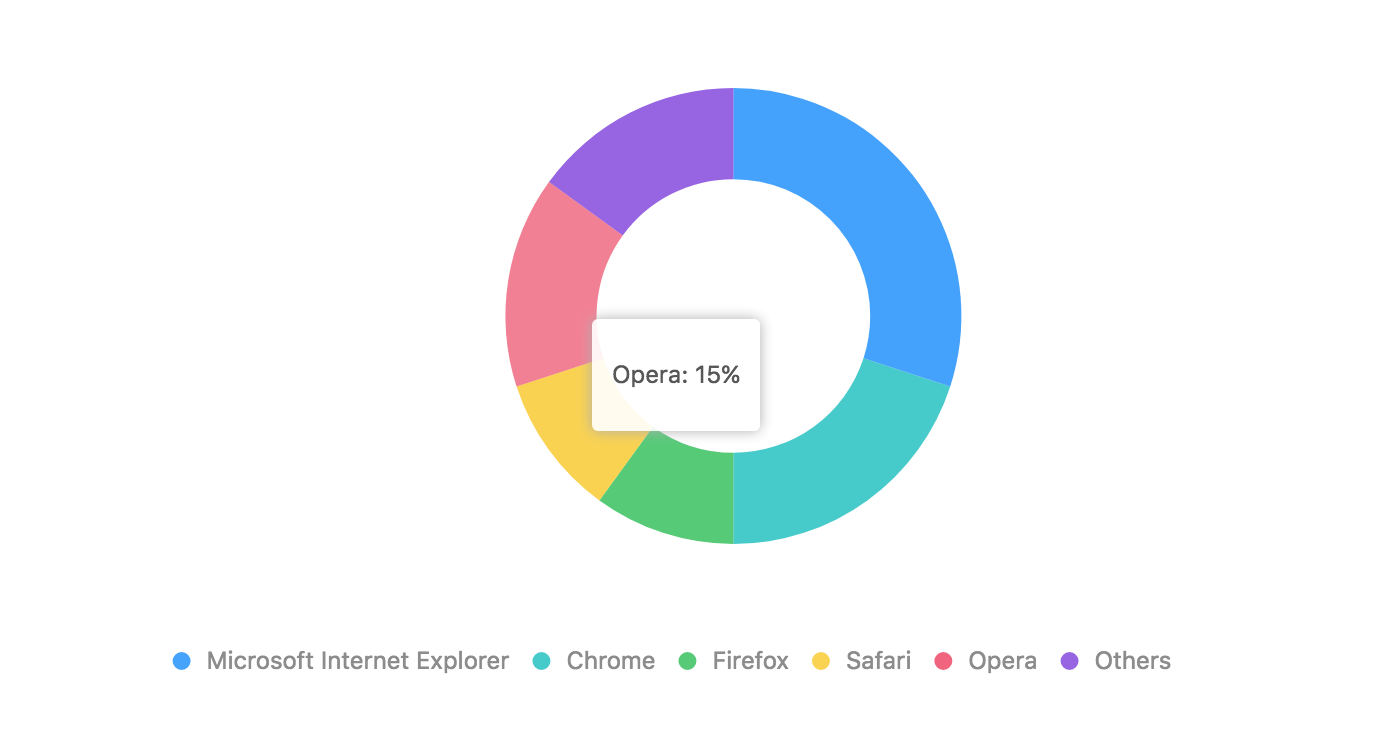
const data = [{ name: 'Microsoft Internet Explorer', value: 30 },{ name: 'Chrome', value: 20 },{ name: 'Firefox', value: 10 },{ name: 'Safari', value: 10 },{ name: 'Opera', value: 15 },{ name: 'Others', value: 15 }];const chart = new G2.Chart({container: 'c1',forceFit: true,height: 400});chart.source(data);chart.coord('theta', { innerRadius: 0.6, radius: 0.8 });chart.tooltip({showTitle: false,itemTpl: '<li>{name}: {value}</li>'});chart.intervalStack().position('value').color('name').tooltip('name*value', (name, value) => {return {name: name,value: value + '%'};});chart.render();
监听 tooltip:change 事件
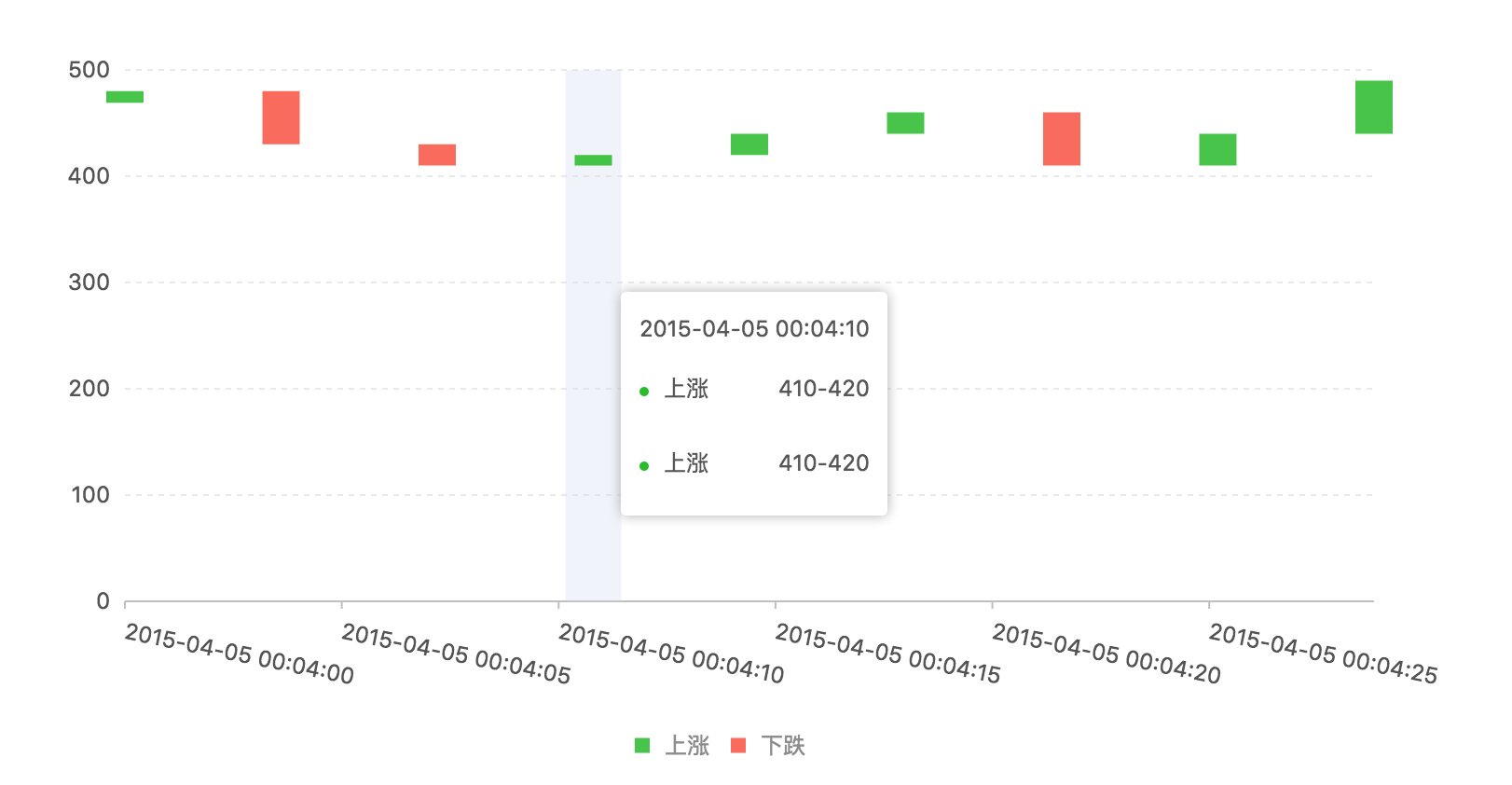
const data = [ // 数据{ time: 1428163200000, start: 469, end: 480 },{ time: 1428163203600, start: 480, end: 430 },{ time: 1428163207200, start: 430, end: 410 },{ time: 1428163210800, start: 410, end: 420 },{ time: 1428163214400, start: 420, end: 440 },{ time: 1428163218000, start: 440, end: 460 },{ time: 1428163221600, start: 460, end: 410 },{ time: 1428163225200, start: 410, end: 440 },{ time: 1428163228800, start: 440, end: 490 }];const DataView = DataSet.DataView;const dv = new DataView();dv.source(data).transform({type: 'map',callback: obj => {obj.range = [ obj.start, obj.end ];obj.trend = (obj.start <= obj.end) ? '上涨' : '下跌';return obj;}});const chart = new G2.Chart({container: 'c2',width: 800,height: 400,padding: [ 20, 50, 95, 80 ]});chart.source(dv, {'time': { // 设置日期类型type: 'time',mask: 'YYYY-MM-DD HH:MM:ss'},'trend': {alias: '趋势'}});chart.interval().position('time*range').color('trend', [ '#1bbd19', '#fa513a' ]).size(20);chart.render();chart.on('tooltip:change', function(ev) {const items = ev.items; // tooltip显示的项const origin = items[0]; // 将一条数据改成多条数据const range = origin.point._origin.range;items.splice(0); // 清空items.push(Object.assign({name: '开始值',marker: true,value: range[0]}, origin));items.push(Object.assign({name: '结束值',marker: true,value: range[1]}, origin));});
自定义 html 模板
G2 也支持使用自定义的 html 展示 tooltip。配置方法如下:
chart.tooltip(true, {containerTpl: '<div class="g2-tooltip">'+ '<div class="g2-tooltip-title" style="margin:10px 0;"></div>'+ '<ul class="g2-tooltip-list"></ul></div>',itemTpl: '<li data-index={index}><span style="background-color:{color};width:8px;height:8px;border-radius:50%;display:inline-block;margin-right:8px;"></span>{name}: {value}</li>'});
containerTpltooltip 容器模板 ,注意一定要包含以下 class:
<div class="g2-tooltip"><!-- tooltip 标题 --><div class="g2-tooltip-title" style="margin:10px 0;"></div><!-- tooltip 内容列表容器 --><ul class="g2-tooltip-list"></ul></div>
itemTpltooltip 每项记录的默认模板:
<li data-index={index}><!-- 每项记录的 marker --><span style="background-color:{color};width:8px;height:8px;border-radius:50%;display:inline-block;margin-right:8px;"></span>{name}: {value}</li>
对于 tooltip 的显示样式的配置,用户可以:
在自定义模板时使用内联的方式直接定义;
在 html 页面的 style 标签内,为对应的 dom 标签设置样式;
在
chart.tooltip(cfg)中设置属性,如下,具体的说明详见 API
chart.tooltip({'g2-tooltip': {position: 'absolute',visibility: 'hidden',border : '1px solid #efefef',backgroundColor: 'white',color: '#000',opacity: "0.8",padding: '5px 15px','transition': 'top 200ms,left 200ms'}, // 设置 tooltip 的 css 样式'g2-tooltip-list': {margin: '10px'}});
其他配置
显示辅助线(辅助框)
默认线图和区域图会显示辅助线、柱状图会显示辅助框,当用户需要显示辅助线(框)时,可以通过配置 crosshairs 属性设置,crosshairs 支持四种展示形式:
crosshairs: {type: 'rect' || 'x' || 'y' || 'cross',style: {// 图形样式}}, // tooltip 辅助线配置
crosshairs.type 说明:
rect: 矩形框
x: 水平辅助线
y: 垂直辅助线
cross: 十字辅助线
‘line’, ‘area’, ‘path’ 默认会展示垂直辅助线;‘interval’, 默认会展示矩形背景框。
改变 tooltip 触发方式
通过配置 triggerOn 参数来改变 tooltip 的触发方式,可配置值为:
mousemove: 鼠标移动至目标区域触发,默认方式;click: 鼠标点击目标区域触发none: 不触发 tooltip,由用户调用chart.showTooltip(point)和chart.hideTooltip()来控制提示框的显示隐藏。
当然在任何触发方式下,用户都可以通过调用 chart.showTooltip(point) 可以控制在固定的位置显示提示信息,参数 point 为画布上的坐标点,格式如下:
const point = {x: 23,y: 30};
另外还提供了 chart.getXY({xField: value, yField: value}) 方法,用于获取数据对应在画布空间的坐标。
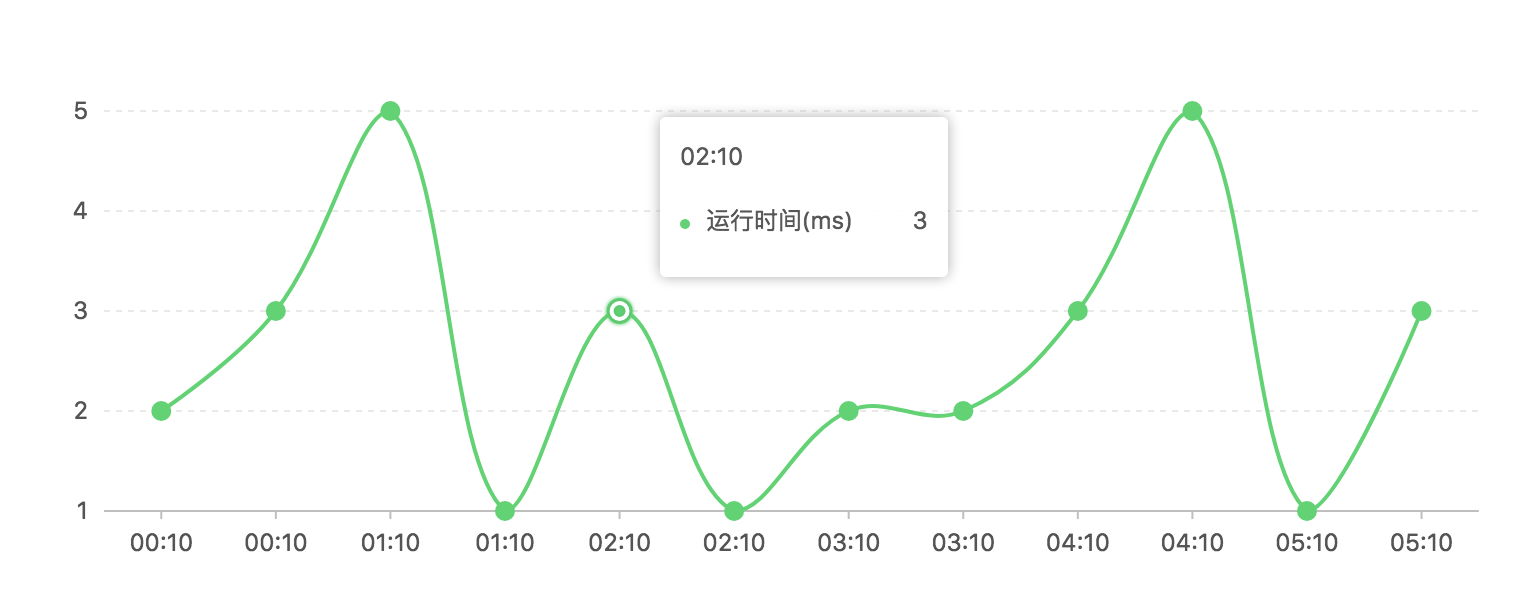
const data = [{ time: '2016-10-25 00:00:00', runCount: 4, type: 2, runTime: 2 },{ time: '2016-10-25 00:30:00', runCount: 2, type: 6, runTime: 3 },{ time: '2016-10-25 01:00:00', runCount: 13, type: 2, runTime: 5 },{ time: '2016-10-25 01:30:00', runCount: 9, type: 9, runTime: 1 },{ time: '2016-10-25 02:00:00', runCount: 5, type: 2, runTime: 3 },{ time: '2016-10-25 02:30:00', runCount: 8, type: 2, runTime: 1 },{ time: '2016-10-25 03:00:00', runCount: 13, type: 1, runTime: 2 },{ time: '2016-10-25 03:30:00', runCount: 4, type: 2, runTime: 2 },{ time: '2016-10-25 04:00:00', runCount: 2, type: 6, runTime: 3 },{ time: '2016-10-25 04:30:00', runCount: 13, type: 2, runTime: 5 },{ time: '2016-10-25 05:00:00', runCount: 9, type: 9, runTime: 1 },{ time: '2016-10-25 05:30:00', runCount: 5, type: 2, runTime: 3 }];const chart = new G2.Chart({container: 'c3',forceFit: true,height: 300,padding: [ 50, 80 ]});chart.source(data);chart.scale('time',{type: 'timeCat',mask: 'HH:MM',tickCount:12,nice:true,});chart.scale('runCount', {alias: '运行数量',min: 0});chart.scale('runTime', {alias: '运行时间(ms)'});chart.tooltip({triggerOn: 'click' // 鼠标点击触发 tooltip}); // 关闭 tooltipchart.legend(false); // 不显示图例chart.line().position('time*runTime').color('#5ed470').size(2).shape('smooth'); // 绘制曲线图chart.point().position('time*runTime').color('#5ed470').size(5).shape('circle').style({cursor: 'pointer'}); // 绘制点图chart.render();// 初始化到最新一个点const lastPoint = chart.get('plotRange').br;chart.showTooltip(lastPoint);

